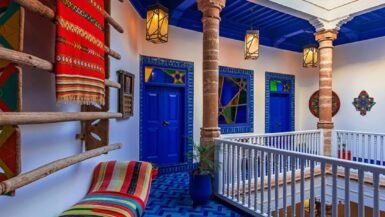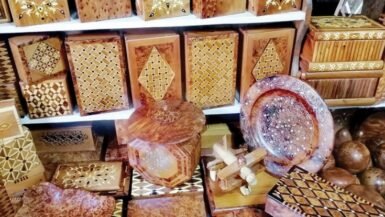Rabat, the capital of Morocco, is a center that combines modernity with a rich heritage of traditional craftsmanship. In this comprehensive guide, we’ll explore together the world of traditional products of Rabat in all its details, from luxurious handmade rugs and carpets to the unique art of Rabati embroidery, and we’ll direct you to the best places to find these treasures, particularly the Traditional Crafts Complex. Whether you’re a tourist looking for authentic souvenirs or an enthusiast of traditional Moroccan crafts, this guide will help you discover the best traditional products in Rabat and how to acquire them.
Table of Contents
Types of Notable Traditional Products in Rabat
Rabat abounds with a variety of traditional products that reflect the skill of local artisans, among the most prominent are:
Handmade Rugs and Carpets
Moroccan handmade rugs and carpets are famous for their beauty and high quality, embodying a craft heritage passed down through generations. The Moroccan carpet is distinguished by its vibrant colors and complex geometric and floral patterns, typically made from natural wool or cotton. Although the cities of Fez and the Middle Atlas are more famous for carpet making, Rabat offers its own distinctive styles.
In Rabat, you can find different types of carpets such as:
- Traditional Carpets: made from natural wool with Arabic and Amazigh patterns
- Kilim Carpets: lightweight and woven with a flat technique
- Boucherouite Carpets: colorful rugs made from recycled fabric pieces
These carpets add a warm, traditional touch to homes while representing an artistic piece that reflects authentic Moroccan culture.
Rabati Embroidery
Rabati embroidery is one of the most important traditional crafts specifically associated with the city of Rabat. This unique embroidery art is characterized by fine stitches and meticulous geometric and floral patterns, often using vibrant colors like red, blue, and green on a white or cream background.
Rabati embroidery is used to decorate:
- Edges of traditional clothing
- Pillows and coverings
- Table linens
- Wedding textiles
What distinguishes Rabati embroidery is its close connection to the identity and heritage of Rabat. It’s an art that requires skill, patience, and perfection, entirely handmade, making it a rare artistic piece worth acquiring.
Where to Find Traditional Products in Rabat? Main Shopping Locations
For purchasing traditional products in Rabat, you have several options, but the most prominent and diverse destination is the Traditional Crafts Complex…
The Traditional Crafts Complex in Rabat (Dar Sanaâ)
The Traditional Crafts Complex is the main center for handicrafts in Rabat, combining workshops and sales galleries in one place. This complex was created with the aim of exhibiting, producing, and selling various traditional products directly from artisans or cooperatives.
During your visit to the complex, you’ll enjoy a unique experience that allows you to watch artisans working in their workshops, in addition to shopping in the stores distributed throughout the complex. What distinguishes this place from traditional markets are its relatively fixed prices and organized atmosphere, making the shopping experience more comfortable, especially for tourists.
In the complex, you can find a wide range of traditional products, particularly distinctive handmade rugs and carpets and authentic Rabati embroidery, as well as leather products, copper items, pottery, and traditional jewelry.
The Old Medina Markets
The markets of the Old Medina in Rabat are another excellent destination for finding traditional products. Among the most notable of these markets: the Old Souk (Old City – Kasbah), Souk Bab Al-Ahad, Souk Al-Maaref, the Small Oudaya Souk, and the Old Medina Souk (Old Rabat). Unlike the Traditional Crafts Complex, these markets are characterized by their vibrant and dynamic traditional atmosphere, where small shops line both sides of narrow alleys.
In these markets, you can bargain prices with sellers, a cultural experience in itself. However, you might need more experience to distinguish authentic and traditional products.
The Craftsmanship Behind Traditional Products in Rabat: Skills Passed Down Through Generations
The traditional products of Rabat reflect the skill and creativity of Moroccan artisans who have inherited this craft from their ancestors. Each piece tells a story of authenticity and history, representing long hours of meticulous work.
During your visit to the Traditional Crafts Complex, you’ll have the opportunity to see artisans working in their workshops, which will enhance your appreciation for the value of these products. For example, you might see women creating Rabati embroidery with fine needles and extreme precision, or craftsmen working on a loom to make handmade rugs.
Preserving these traditional crafts is not merely an economic activity but a protection of Moroccan cultural identity. By purchasing these products, you contribute to supporting artisan families and perpetuating these rare skills.
Visiting the Traditional Crafts Complex in Rabat: A Practical Guide
If you wish to visit the Traditional Crafts Complex and explore Rabat’s traditional products up close, here are the most important information and tips…
Location of the Complex and How to Get There
The Traditional Crafts Complex is located in a prime location near the Kasbah of the Udayas in Rabat, a short distance from the Old Medina and the Kasbah of the Udayas and the Bouregreg River. It is also close to important historical landmarks such as the Mohammed V Mausoleum, Hassan Tower, and Bab Rouah. It is easily accessible by taxi (petit taxi) from any area in the city. And if you’re in a nearby area such as the Old Medina or the Udayas, you can reach it on foot in just a few minutes.
Opening Hours of the Traditional Crafts Complex
The complex is generally open from 9:00 AM to 6:00 PM, Monday to Saturday. It may be closed or operate at different hours during public holidays and the month of Ramadan, so it’s recommended to check opening hours before your visit, especially if you plan to come during holidays.
Entrance Fee to the Complex
Entry to the Traditional Crafts Complex is free, making it an ideal destination for visitors wishing to explore traditional Moroccan crafts. However, there may be nominal fees for visiting certain special exhibitions or small museums inside the complex if available.
Shopping in the Complex: A Different Experience
The shopping experience in the Traditional Crafts Complex differs from traditional markets, where prices are relatively fixed and the bargaining process less intense. The complex is distinguished by its guarantee of authenticity and quality of products, made by certified artisans.
A visit to the complex typically takes between one and two hours, depending on your level of interest in details and your desire to shop. The best time to visit is during normal working hours to see artisans at work.
General Tips for Buying Traditional Products in Rabat
Determine Your Budget and Product Type
Before starting to shop for traditional products of Rabat, determine your budget and the type of product you want to buy. Prices vary greatly depending on quality, details, and the time spent making the piece.
Compare Prices and Quality
Don’t rush to buy; visit several shops and compare prices and quality. It’s recommended to visit both the Traditional Crafts Complex and traditional markets to get a comprehensive idea of available options and reasonable prices.
The Matter of Bargaining (Negotiation)
In traditional markets, bargaining (haggling) is part of the shopping culture. Start by offering a price equivalent to 40-50% of the asking price, then continue negotiating until you reach a price satisfactory to both parties. In the Traditional Crafts Complex, prices are relatively fixed with limited negotiation possibility.
Check Quality and Authenticity
Examine the product well before buying to ensure it is free of defects. To verify the authenticity of products, especially handmade rugs and carpets and Rabati embroidery, buy from reliable places like the Traditional Crafts Complex where products are made according to authentic Moroccan traditions.
Payment Methods and Shipping
Most small shops in traditional markets only accept cash payment, while larger stores and the Traditional Crafts Complex may accept credit cards. If you wish to buy large pieces such as carpets, inquire about shipping options, as most sellers offer international shipping services for an additional cost.
Conclusion: Traditional Products of Rabat… An Authentic Art That Deserves to Be Discovered
The traditional products of Rabat constitute a cultural and artistic treasure that deserves to be discovered, from luxurious handmade rugs and carpets to meticulous Rabati embroidery, to various other handicrafts. The Traditional Crafts Complex is the ideal place to explore and acquire these products, offering a shopping experience that is both comfortable and authentic.
When you purchase traditional products, not only do you obtain a beautiful piece, but you also contribute to supporting local artisans and preserving a rich heritage that extends over hundreds of years. Don’t miss the opportunity to visit the Traditional Crafts Complex and discover for yourself the splendor of Rabat’s traditional craftsmanship.
Additional and Useful Resources
For more information about Moroccan tourism and culture, you can visit:
- Official Website of the Moroccan National Tourism Office
- Ministry of Culture, Youth and Sports of Morocco
- Moroccan Cultural Heritage Foundation
- Guide to Traditional Moroccan Crafts
Share your experience with us and leave a comment about the traditional products you liked in Rabat, and don’t forget to share this guide with your friends interested in travel and Moroccan heritage.






Leave a reply